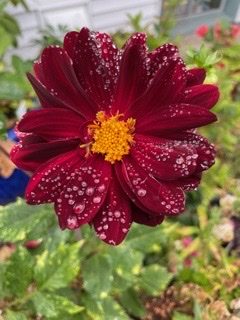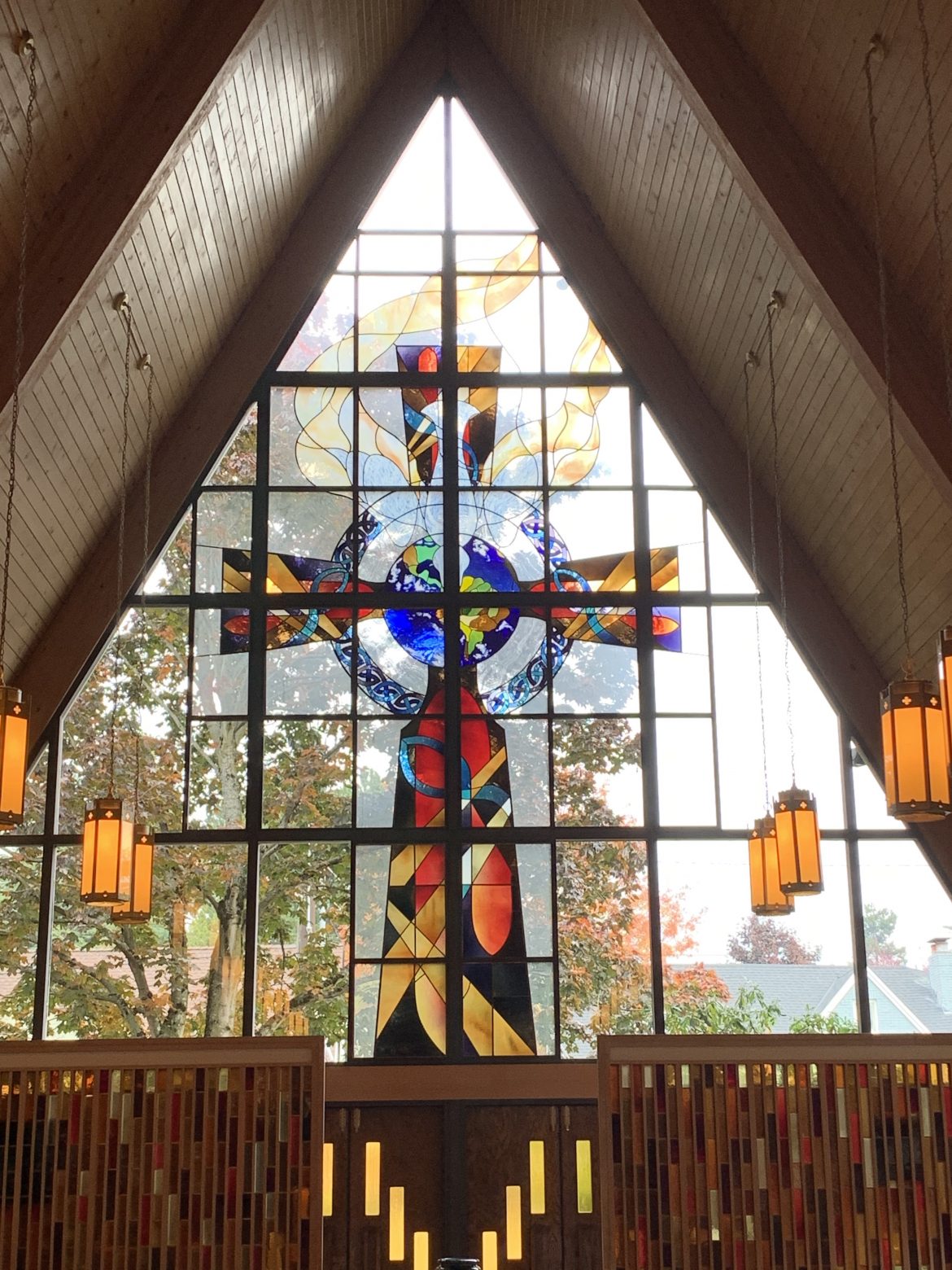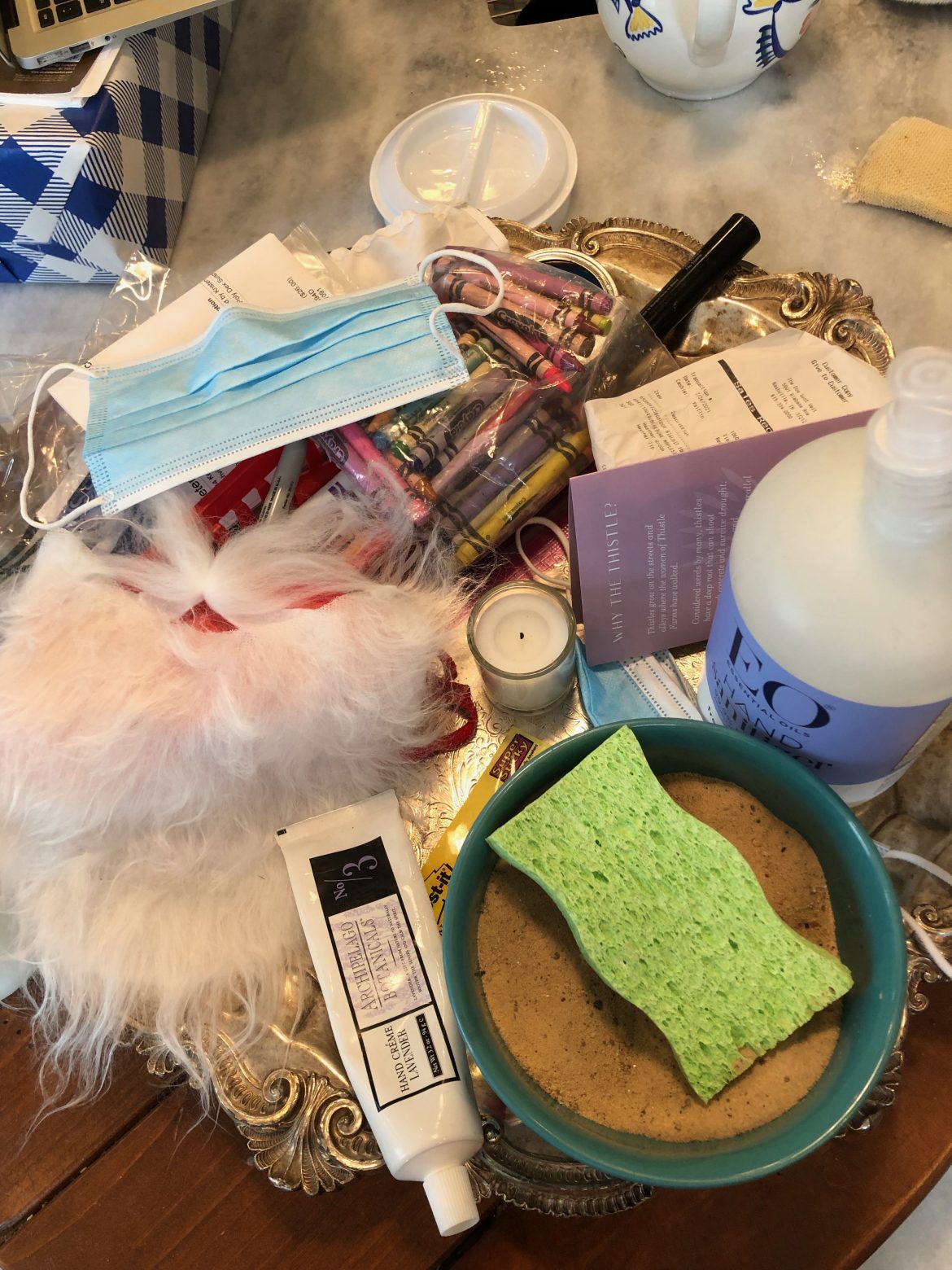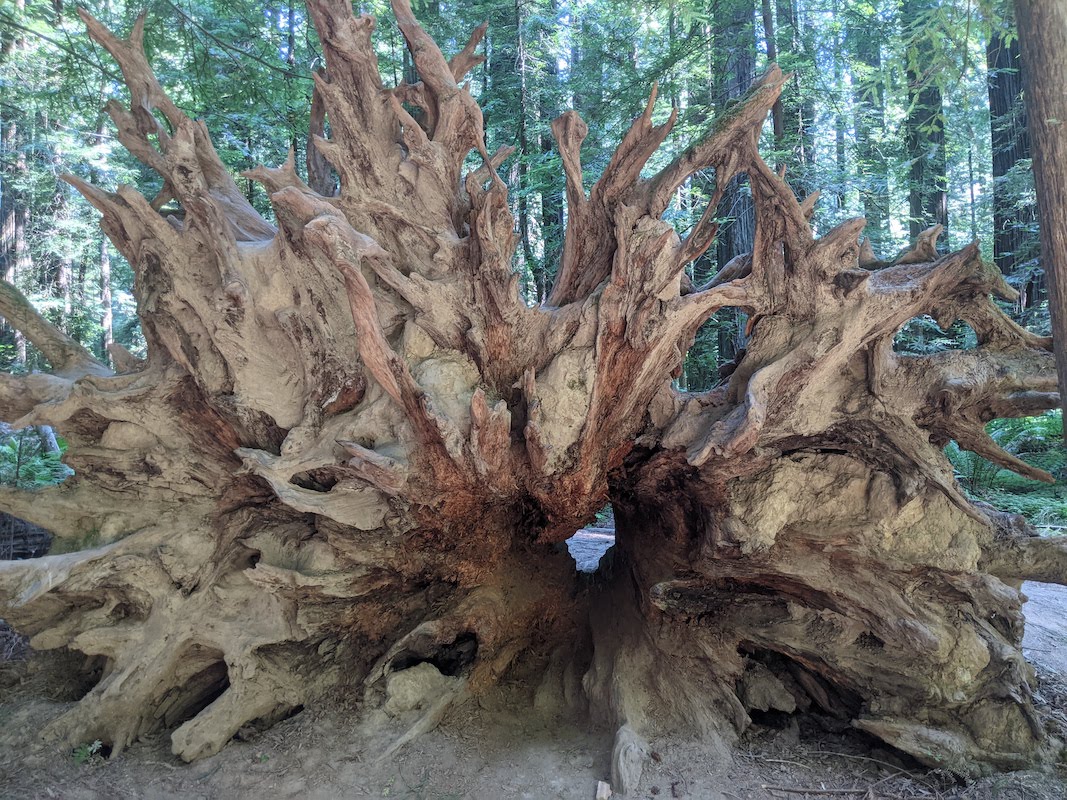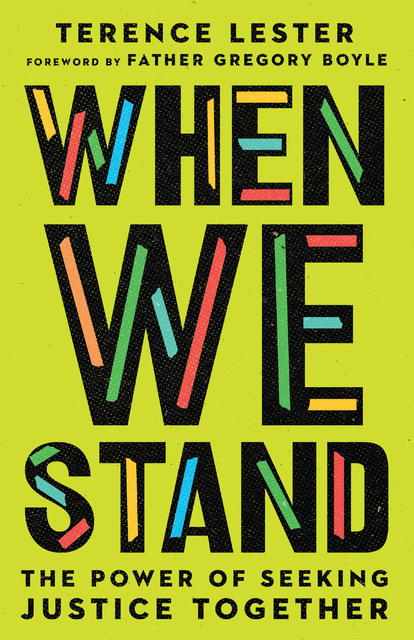by Christine Sine,
On Friday, I walked around the garden in the rain. So what you might think, you live in Seattle; it always rains there, doesn’t it? Actually no. In fact, we have had one of the driest summers on record so the refreshing rain was wonderfully invigorating and it was a delight to get out and walk in it.
I have always loved walking in the rain, though I must confess that the cold winter rain of Seattle is sometimes a little miserable for me. In fact, give me a couple of months and I will probably not be rejoicing in the rain but rather grumbling whenever I need to go out in it. However, if I maintain that childhood delight of splashing through puddles and relishing the raindrops falling on my tongue, it is wonderful no matter what the season. And the seasons are changing so I definitely need to get ready for those cold drippy days that lie ahead.
It’s all about attitude though. I am gearing up for a new season and part of that preparation is changing my attitude to walking in the rain. This walking in the rain is really a very spiritual thing after all and there is great benefit in embracing and enjoying it whatever season I am in.
Evidently, rain is good for us not just physically but emotionally and I suspect spiritually too.
Walking in the rain lifts our spirits. Have you noticed that standing inside watching the rain pour down makes us feel grumpy and depressed whereas getting out and walking in the rain actually lifts our spirits? Raindrops on our faces and wind in our hair make us feel alive and renewed. There is nothing more invigorating than the smell of rain after a long period of dry weather. And evidently, there is a reason for that.
Bacteria, plants and even lightning can all play a role in the pleasant smell we experience after a thunderstorm; that of clean air and wet earth. Known as petrichor, the scent has long been chased by scientists and even perfumers for its enduring appeal. (Petrichor: Why Does Rain Smell So Good? )
God has designed us to appreciate rain and to be enlivened by it. Maybe we can even develop our own brand of fragrances from it. At the least, we can learn a few lessons from it as we gear up for this new season.

Photo by Matteo Catanese on Unsplash
Rain is a miracle that helps us see the world and the people in it differently. It changes our view of reality as though we are looking through a different lens. Familiar places look different. Well-known people look different and in the midst, we sometimes catch different glimpses of God – a God who provides the miracle of rain to refresh the earth so that the crops will grow, and people will thrive.
He does wonderful things that confound,
infinite numbers of miracles.
He gives rain to the earth,
sends down water to the fields;
He lifts up the downtrodden, bolsters the bereaved,
raising them to safety. (Job 5:9-11 The Voice)
Rain teaches us acceptance. Rain is indifferent to our plans and our desires. I remember once praying fervently that God would stop the rain… because I had planned a picnic for that day. And guess what, the rain did not stop. God (and the rain) were indifferent to my self-centeredness. It helped me to let go of my best-laid plans and expectations of the day.
Rain represents something beyond our control, like the absurdities that happen in our daily lives. Accepting things as they are and choosing to continue to go about our business of living life in a positive mood leads to greater happiness. (The Benefits of Walking In The Rain)
More than that, walking in the rain helps build stamina and resilience preparing us for the less than ideal conditions that we experience in other parts of our lives too. It takes more effort to walk in the rain, especially against the wind.
Rain provides a place of solitude. I love to walk with my husband and with friends, to talk and share moments of delight as we walk, but I also love the aloneness of a rain-filled walk that isolates me into a secret world of my own thoughts. This is particularly true of an urban walk through usually noisy and crowded streets which have suddenly become a quiet refuge that you have all to yourself.
Rain cleans the air and for those who live in heavily populated urban areas, this might be the most healthy time to get out and explore the neighbourhood.
Rain is a gift that reminds us of that even greater gift – the gift of water without which no life would exist. Walking in the rain is a little like being baptized once more with this precious gift.
What Is Your Response?
Is it raining where you live? Consider a walk outside on your own to enjoy the invigorating effects. Otherwise, close your eyes and remind yourself of the last time you took a walk in the rain and how it made you feel.
Imagine lifting your face to the wind.
Feel the rain in your hair and the wind on your face. How does it make you feel? Are you aware of God touching your spirit in the same way that the rain is touching your hair?
Taste the raindrops landing on your tongue. Imagine them cleansing not just the air around you but also your spirit and your soul. Is there something specific that needs cleaning in your life that God is prompting you to consider?
Look around you – what do you notice that looks different? Is there something that God would speak to you about through that difference?
Listen for the voice of God in the silence. In the uncluttered space, without traffic noise, is there something that you hear God saying to you?
If you have time, watch this wonderful contemplative morning prayer service around the whole topic of rain.
This post is adapted from a previous Godspace post: https://godspacelight.com/2019/10/24/the-delight-of-walking-in-the-rain/
It’s not too late to learn more about summer practices and connecting with God through summer symbols and experiences! Check out Christine Sine and Lilly Lewin’s Making Time for a Sacred Summer Online Retreat. This course allows you 180 days of access for only $24.99!
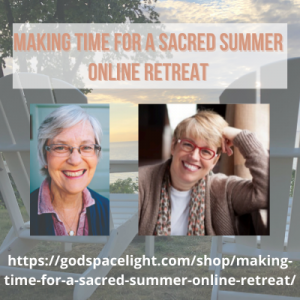
Another beautiful contemplative service in the style of Taize from St Andrews Episcopal Church in Seattle.
A contemplative service with music in the style-of-Taize.
Carrie Grace Littauer, prayer leader, with music by Kester Limner and Andy Myers.
Permission to podcast/stream the music in this service obtained from One License with license #A-710-756 with additional notes below:
“Sing Hallelujah to the Lord” – copyright 1974 by Linda Stassen, Renewed 2002 Linda L. Benjamin.
“God is Forgiveness” and “In the Lord” are songs from the ecumenical Taize community in France. Copyright and all rights reserved by GIA/Les Presses de Taizé.
“On Christ the Solid Rock” – is a public domain hymn. Arrangement and additional verse by Kester Limner. Shared under the Creative Commons License, Attribution (CC-BY).
“Kyrie” – words and music composed by Kester Limner. Shared under the Creative Commons License, Attribution (CC-BY).
This jumble of things represents the last year and a half of life at our house. Masks and hand sanitizer, symbols of things we’ve used in online worship at #thinplaceNASHVILLE, art supplies that have kept me sane, a Santa mask that arrived after Christmas that sadly we might need again this year, lotion for all the hand washing. Carry out/takeaway receipts…including our go-to the cafe at Thistlefarms!
It’s been quite a season of change, frustration, joys, and trauma!
Yesterday, I finally cleaned off this tray and the counter that’s held it for so many months… Opening up the way for new things but taking time to notice all the things that have led to where I am today. All the growth and change and all the things that are still very much the same.
So grateful for life and love and for my husband Rob putting up with me over all these months. Grateful for masks and vaccines and for Zoom church and Facetime calls! And grateful for all that Jesus has done and will do with the piles of stuff we all have from 2020 and 2021!
What are the symbols of this last year for you?
Take a look around your house, or through your journal, what do you notice?
What are you learning about yourself in this season?
Take some time to reflect and ponder before we get so far ahead that we forget the richness of all of the messiness of these months.
What do you want to remember?
What do you still need to grieve and process?
We all have stuff to grieve AND we have things to celebrate and be grateful for too.
Take some time this weekend to be grateful for all the good things in your world right now and all the good things of this past year! Make a list, create a collage, or call a friend and share the good things! Start a gratitude journal for this new month and next season!
You might use the notes app in your phone to make a list each day of things to be grateful for… or take a photo each day to help you remember. Then stop and look back through your lists and photos at the end of the month and praise God for all these wonderful things!
READ PSALM 118: Today and use it to help you get started with your new season! READ in different translations and see what the Holy Spirit has for you!
I’d love to hear what you’ve been learning in these last few months! And what you are thankful for as you begin this new season!
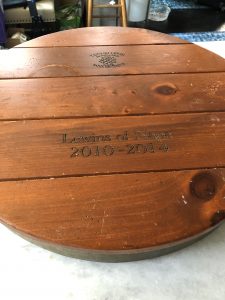
Remember we get to start with a CLEAN SLATE!
©lillylewin and freerangeworship.com
Embark on this healing journey with Christine Sine, Lilly Lewin, and Bethany Dearborn Hiser with the Time to Heal Online Course. Each session is lead by one of our instructors and allows you 180 days of access for only $39.99. The goal of this course is to provide time, space, and tools to work toward healing.
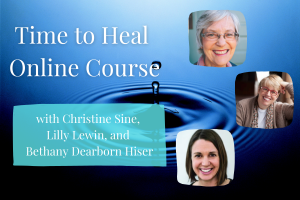
post and photos by Lisa Scandrette,
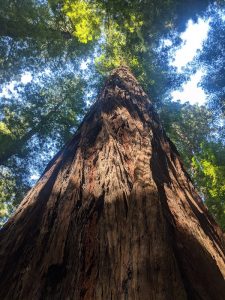
by Lisa Scandrette
I fall asleep under the vast summer skies, a multitude of stars twinkling above. I breathe deep the smell of giant redwoods and duff from the forest floor. I wake to the morning songs of birds. I am part of this creation—right in the middle of it—made from the dirt and the stardust. I am not separate from nature. I am breathing your breath, soaking in your love in the coolness on my skin, reading your messages in the twinkling morse code of stars. When I am here, my daily cares are put in perspective. I am small, you, Creator, are big, and I am both less significant and more precious than I sometimes imagine. I belong, without question, in this place.
Here I am stripped down to what is essential. I am open to wonder and curiosity. What is that bird I am hearing? How old is this tree? What is this tiny flower? Where does this path lead? You and your creation are full of mystery. These redwoods grow to the size of 30 story buildings and weigh a million pounds, intertwining their roots to help hold one another up. When they fall, they feed multitudes for hundreds of years. My mind cannot fathom. Yet, I do not need to understand this mystery in order to enter in. I am content to simply bathe in it.
Your paths are gentler to my feet and joints than the paths I create for myself. You carpet them with redwood duff and moss. Rocks under my feet, cool river water running over my ankles. You lead me beside quiet waters, you restore my soul. The air you surround me with refreshes me. Your fragrances are everywhere. You smell like redwoods, water, connectedness, and freedom. You are spacious—attentive to the very small and the very large. Nothing is beyond your notice.
I wonder if I will become acclimated to this ancient forest, forgetting to stand in awe. Yet, each new exploration catches my breath. You stun me. You have thought of everything—the intricate interconnectedness of every species, the way they nourish and protect one another for thousands of years. You haven’t forgotten anything.
I confess that I forget, that I do not remember our interconnectedness, that I do not care as well for creation as I would like. As humans, we have taken more than we should. We have destroyed these ancient cathedrals and have given up abundance and connectedness for a lie of more and bigger and better. We have been ignorant and greedy. We’ve not understood the mystery. We have destroyed rather than nourished. Forgive us and help us remember how to be a harmonious part of this finely tuned system. Give us wisdom and heart to move forward with healing steps.
Being surrounded by your works heals me. When I wake up and wander, breathing the redwood air, or plunge my feet in cool waters, when I settle into quiet and wonder, it is easy to believe what is most real and true. You meet me, envelop me, surround me. I am safe, companioned by you.
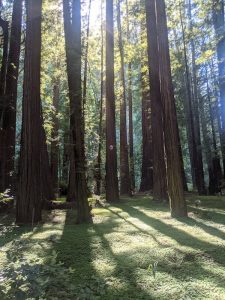
by Lisa Scandrette
An invitation:
As we navigate healing from the past year and a half of COVID-19, raging forest fires, division, and continuing struggles for racial equality, it is easy to become discouraged. We need to heal to keep participating in God’s good dreams for our world. Can you nourish yourself by taking some time to listen to creation speak? Can you find a place to walk in wonder and to listen to God speak through the gift of creation? What will you hear?
Want to experience more of the awe and wonder that God offers us? Check out the Gift of Wonder Online Retreat by Christine Sine. This retreat allows for 180 days of access for only $39.99 so you can move through the sessions at your own pace.
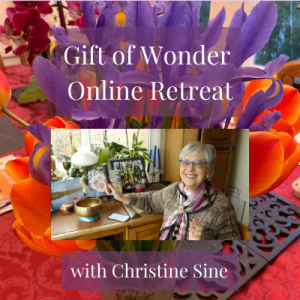
Adaptation from When We Stand by Terence Lester, Adapted from Chapter 9, “Bring Someone With you!”
I was introduced to church as a kid by my grandmother, Jessica Lester. In fact, she’s the reason that I was exposed to church at an early age. She had tremendous faith and made sure that I was around godly things when I was about eight years old when my dad was in prison. However, those concepts were very hard for me to grasp, and my childhood faith was based on needing to get things right. I never fully understood what it meant that God was full of grace and loved me even when I messed up. As I grew, my search for identity was cloudy, and I succumbed to many social pressures. I joined a gang, was rebellious, sold drugs, dropped out of high school for a time, ran away as a teenager, and even ended up in jail once after committing a small crime so I could party with my college friends. Fortunately, a judge decided to show me latitude when my mother begged him to let me go home. I can remember his words even now. He said, “This is the only chance you’re getting. I see the pain your mom is in and the worry in her eyes. You need to get right and never look back.” This is the same judge who was notorious for giving young Black men long sentences. I never did look back.
God used that day to cause me to remember all of the lessons my grandmother tried to teach me as a child. Not long after moving back home from college to start over, I received a phone call from my childhood friend Harvey that changed the trajectory of my life. Harvey and I had grown up similarly, each of us having family challenges and searching for identity. But when we were both in our twenties, Harvey found his identity in God. One day, after he’d only attended his new church a few times, he called me. I was lost. I had just gotten out of a jail and had my charges dropped. He extended an invitation to come with him to church. I remember having some reservations about going, but I also knew that I needed something. So I found myself in church with Harvey that next week.
The pastor preached from Romans, and I listened as he talked about Jesus dying for me while I was still a sinner. The verse that he read was this: “But God demonstrates his own love for us in this: While we were still sinners, Christ died for us” (Romans 5:8 NIV). Before that moment, I had never understood the true, unconditional love of God. That good news would shape the rest of my life’s work. The gospel message is what has fueled my desire to influence the lives of others for good, showing God’s grace and mercy to those who have often never experienced it. Love Beyond Walls might have never existed had Harvey not decided to follow that nudge to ask me to attend a small Bible study with him.
Our efforts don’t have to be grandiose to have a profound impact. Harvey dialed my number and then sat next to me; that’s it. He had only been back in church for a short time. He didn’t know all the answers to the questions of Christianity, nor did he hold a master’s degree in theology. He only knew that I was struggling, lost, and in much pain from the journey in my life. He also knew I had the potential to be someone great. He was just being the community that I needed. And he communicated this simple but much needed truth with his actions—he was there with me and so was God the whole time. It still brings tears to my eyes because his invitation changed my life, and Harvey is still working alongside me twenty-plus years later at Love Beyond Walls. We can all extend an invitation to people to come with us to serve in order to benefit their lives and because we believe they’ll benefit the lives of others. Whether we’re inviting them to church or to join us at another kind of organization, a simple invitation can have monumental effects.
FORGET ABOUT BEING AN EXPERT
It’s important to educate ourselves on issues of injustice, but a lack of understanding about every nuance shouldn’t keep us from entering into the fight or from inviting others into it. In order to work for justice, we need to possess a willingness to collaborate with others and to learn from them as we navigate new issues or begin to volunteer for an organization. We rarely have everything figured out when God asks us to embark on a task. Rather, he encourages all of us to become part of what he is already doing, right alongside others who are figuring it out as they go too.
There’s an insidious voice that whispers to us, constantly reminding us that we’re either incapable of taking the steps needed to pursue our ideas or that what we have in mind is simply too difficult to accomplish. But the Bible shows us that this is a lying voice. I’m reminded that the early disciples had no special skills that made them stand out to Jesus. He chose regular, ordinary fishermen like Peter and Andrew to be his disciples—men who possessed no unique talents that would have qualified them for ministry. What they had was a willingness to be led by him. In the Old Testament, God acted through Rahab, a woman who worked as a prostitute and who consequently would have been considered by most to be unworthy for God’s work. He often chose people who were not of high status or fame to carry out his work; their abilities manifested themselves in their bravery and in their dependence upon God. Advocating on behalf of the poor requires no expertise, and neither does showing mercy to a condemned woman or giving to an orphan or a widow.
INVITE PEOPLE INTO COMMUNITY
Finding others for the fight cannot be a one-strategy mission. By that, I mean that our eyes should be trained to see the gifts of not only our friends, family, or coworkers but also those whom we serve. As we forge and develop connections with those who are living in poverty, we should not limit our understanding of such individuals by seeing them solely as people who require care; rather, we should ensure that we also think of them as people who have something meaningful to contribute to the community.
The empowerment, the affirmation of the dignity of all people, is that which makes a true community. It is that which helps every member to flourish.
What would it look like if every person were given an equal chance to succeed and to show up as a fully accepted member of society? This is the real essence of social justice: the pursuit of a society that welcomes each and every person and draws them into a community that is excited about what they have to contribute. Jesus extended an invitation to everyone he came across, no matter their social standing, because he knew that they had all been made in the image of God. Indeed, he did so to such an extent that he was criticized for it by those who didn’t understand God’s intention to restore all people.
Challenge yourself to think about the people you know, and catalog the skills of your friends, family, and coworkers. Then begin to cast a vision for each of them. Let them know that you see them.
Adapted from When We Stand by Terence Lester. Copyright (c) 2021 by Terence Brandon Lester. Published by InterVarsity Press, Downers Grove, IL. www.ivpress.com
Bio for Terence Lester
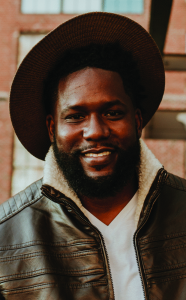
Terence Lester is the founder of Love Beyond Walls, a nonprofit organization focused on poverty awareness and community mobilization. His campaign #LoveSinksIn, which provides handwashing stations for the poor, has been featured on Good Morning America and CNN and in Essence and Reader’s Digest, and he was named by Coca-Cola as one of their History Shakers. Terence is the author of I See You and When We Stand.
The Spirituality of Gardening Online Course is available for 180 days of access for only $39.99. This interactive course includes video sessions with Christine Sine as well as 8 other guest gardeners. Visit our store page for more information.
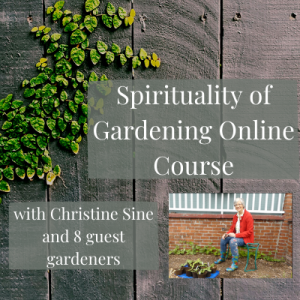
post and photos by Carol Dixon, (The Abbey Gardens, Tresco)
When my husband Donald & I were on holiday in the Scilly Isles in July this year for our belated ‘Golden Wedding holiday’ (a year late due to the Covid pandemic) we visited the beautiful tropical Abbey Gardens on Tresco, in the Scilly Isles, just off the coast of Cornwall in the UK. It was something we had wanted to do for a long time. It is certainly a Garden for all Continents with the Mediterranean Garden, The Eastern Garden, and South Seas Garden with palm trees and other exotic plants but it is also a Garden for all Seasons with its evergreens and fir trees that seem to reach the sky.
Dorothy Frances Gurney wrote: ‘You are never closer to God’s heart than in a garden.’
THE Lord God planted a garden
In the first white days of the world,
And He set there an angel warden
In a garment of light unfurled.
So near to the peace of Heaven,
That the hawk might nest with the wren,
For there in the cool of the even
God walked with the first of men.
And I dream that these garden-closes
With their shade and their sun-flecked sod
And their lilies and bowers of roses,
Were laid by the hand of God.
The kiss of the sun for pardon,
The song of the birds for mirth,–
One is nearer God’s heart in a garden
Than anywhere else on earth.
For He broke it for us in a garden
Under the olive-trees
Where the angel of strength was the warden
And the soul of the world found ease. © Dorothy Frances Gurney
Gardens are places where it is easy to draw close to God. Margaret Silf in her book ‘Landscapes of Prayer’ speaks of the seasons of our heart in a section entitled, The Garden:
What, I wonder, does a. garden mean for you? Summer days enjoying the scent of new-mown grass and the fragrance of the flowers? Birdsong? Vegetables and herbs that travel only the distance between your kitchen garden and your table? Or maybe hard work, an aching back, an invincible army of weeds? It is good to remember that God is in all of these aspects of your heart’s garden, and that prayer is to be found in the labour as well as in the love, in the heart’s aching as well as in the heart’s desire?
Your heart is a garden, the place you go to meet God in prayer, and the place where God meets you, to help you tend the sacredness you share. There will be weeds there, for sure, and maybe brambles and thorns. No human heart is without these. Sometimes, perhaps, it will be good to uproot them, so that they don’t spread any further. And at other times it may be good to leave them and remember that sometimes a “weed” is just a flower we didn’t plant, which refuses to submit to our control. There will be desires and yearnings in our garden, striving for the light, like enormous sunflowers, or insinuating themselves into our dreams, like rambling roses. There will be blossoms of pure joy, and other plants that may harbour thorns, stings, or poisonous intentions, like nettles and nightshade.
You will have to work at your garden, if it is to remain a sacred space. You will need to cultivate your heart’s prayer, by watering it regularly with your focused attention, pruning back anything that is growing out of control, turning over the soil as you reflect on your own life and relationships. But you will have help. The birds will serenade you as you toil and will eat the pests that threaten your plants. The bees will pollinate your flowers for you and the worms will ventilate your soil. They all remind us that the garden does not belong to us, but we belong to the garden. We are not in sole charge of anything, not even of ourselves, but we are living cells in the body of all creation, living in mutual inter-dependency with all inhabitants of planet Earth.
A good garden gives life to many creatures as well as to its gardener. In what ways does your heart, your life, give life and nourishment to others? What herbs, such as sincerity or gentleness, grow in your heart and add their special flavour to the feast of life? Does anything you find there threaten to spoil the feast for others? Sarcastic tongues, for example, or spiteful gestures? What gifts bear fruit in your life and bring joy to others? Is there anything in the way you relate to others that threatens to overwhelm them with impatience or intolerance and choke the channels of love? And a garden is a place of loving companionship. Who shares the sacred space of your heart’s garden? How lovingly do you share the space of others when they invite you to enter their holy ground?
A TIME FOR TENDING
Take a little while in a quiet space tending to the garden of your heart
- How is the weather in your garden this morning? Is it sunny or foggy, bright or overcast in the core of your being today?
- What season is it? Do you feel full of energy, or heavy in the grip of winter? Is new life burgeoning in you & springing up, or are things dying away? What is making you feel more alive? What is tending to deaden you?
- What blossoms do you want to show, grown from the seeds of love God has planted in your heart? What fruits or gifts from your life would you want to offer to God, to share with others?
- Are there any weeds you would like him to deal with? Does anything need pruning, and can you ask for the courage to let God do what needs to be done?
- Are you content to let God be the Gardener, or are you trying to do it all yourself?
Try describing the garden of your heart, either in words or images to the Gardener in the silence you share, and perhaps also to a trusted friend.” [© Margaret Silf 2011]
Imagine yourself sitting on a seat in a garden. Perhaps there is a pool near you with dancing dragonflies and goldfish flashing to the surface from time to time. As you soak up the peace and beauty of the place, ask the Holy Spirit to bring to your mind people and situations you know to be in need of God’s healing love.
One of my favourite songs that my children learned when they were at school is ‘When God made the garden of creation’.
When God made the Garden of Creation
He filled it full of his Love.
When God made the Garden of Creation
He saw that it was good.
There’s room for you
And room for me
And room for everyone,
For God is a Father who loves his children
And gives them a place in the sun.
When God made the Garden of Creation
He filled it full of his Love.
When God made us Stewards of Creation
He gave us his Vision to share
When God made us Stewards of Creation
Our burdens he wanted to bear.
He cares for you,
He cares for me,
He cares for all in need;
For God is a Father who loves his children
No matter what colour or creed.
When God made us Stewards of Creation
He gave us his Vision to share.
© Paul Booth (1931-1995)
A blessing: May God the Creator fill your days with abundant blessings,
May Christ the Living Water refresh you each morning with love,
May the Holy Spirit dance through the garden of your life
sprinkling joy and hope and peace as you go on your way;
and the blessing of God the three in one be with you now & always. Amen.
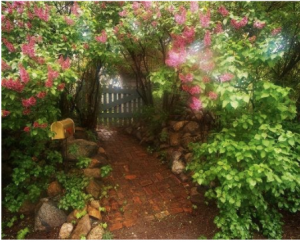
by Carol Dixon
Join the Godspace Light Community Group on Facebook! This is a place to discuss a whole-life faith that embraces spirituality especially contemplative, Celtic, & creative spiritual practices, environmental & economic sustainability, social & environmental justice, and gardening & creation care.
by Christine Sine,
This morning I turned on the kitchen lights when I got up. It’s the first time since summer began. We are still looking forward to the warm days and abundant harvests for August and September, but the shortening days are my first warning that the seasons are about to change. It reminds me of when I worked in Jamaica. One of the common road signs read You Have Been Warned. It didn’t tell you whether there was a sharp curve or a pothole ahead, you just knew that it was time to be alert and keep your eyes open for change.
Change is the most constant aspect of our world. Seasons change, lives change, the world changes, and our faith changes. I am a hot weather person and hate to think that summer may be on its way out. In my lazy enjoyment of summer beauty and relaxation, it is easy to bury my head in the sand and forget. It’s easy to ignore the changes and procrastinate on my preparations for the new season. I don’t want to be a killjoy either. I want to enjoy the rest of the summer to its full. But I do need to be alert to the signs that autumn and winter are on their way and change is coming. Being alert means I can plan well to both embrace and accept change without fear or regret. It is for all these reasons that we have chosen Gearing Up for a New Season as the Godspace theme for the next couple of months.
Change is in the air, notice it, embrace it, and don’t regret it seems like a good mantra for August!
What Needs to Fall Away?
The most obvious autumn change is the transformation of leaves from green to red and yellow – a bright flurry of breathtaking colour before the leaves fall stripping the trees to their bare bones.
“What needs to fall away in my life as I look towards the next season?”, I wonder. It’s hard to let go of summer. I love the warmth, the riot of colourful blossoms, the beauty, the fragrance, and the delightful sounds of bees and birds. I love the harvesting of tomatoes, squash, and summer greens. Yet as Ecclesiastes reminds us, “To everything there is a season.” Letting go and allowing what needs to fall away to pass without regret is important if we are to embrace the new that God has for us.
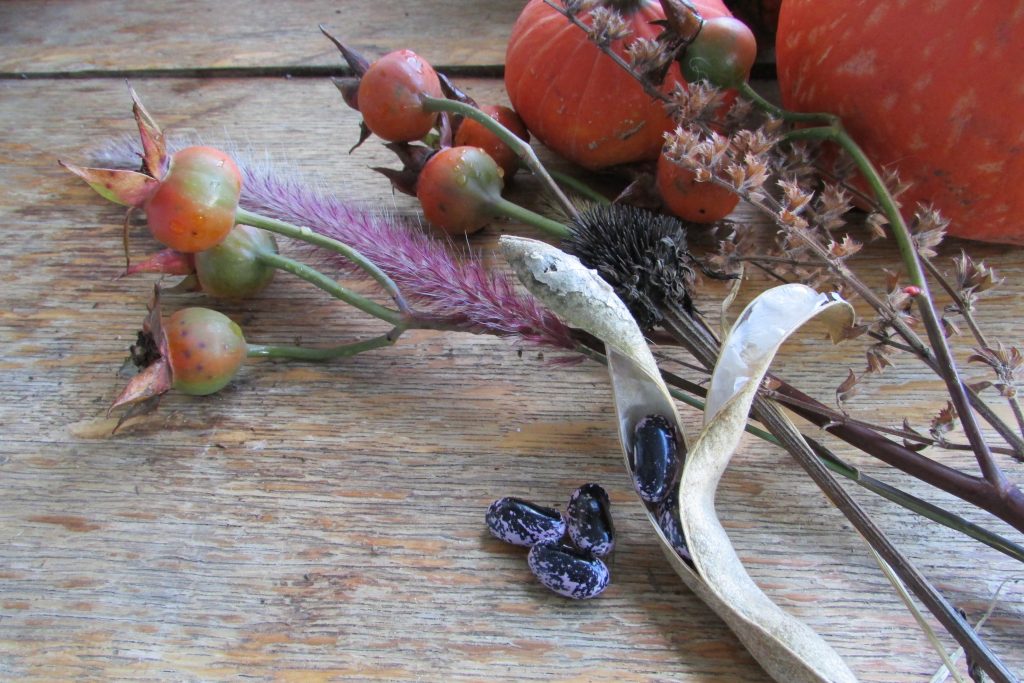
Autumn arrangement
What needs to be planted for future growth?
August is often our hottest month in Seattle, and prime time for vacations and for harvesting tomatoes and squash, but it is also time to plant for fall and winter harvests. However, what I plant is very different from my spring garden. I don’t plant tomatoes and squash that need heat to mature. I plant spinach, Asian greens, broccoli, and root crops that I know will enjoy the cooler weather and mature quickly before the frost. I also plant overwintering crops that can get a good start now then sit dormant through the coldest months before maturing early in spring next year.
I am also reminded that autumn is the best time to plant new shrubs and trees. Over the winter they may look barren and lifeless above ground, but deep down their roots will grow, reaching towards life-giving water that sustains them during next year’s dry summer months. Without this root, growth and future harvest will be small and spindly.
I need the same responsibility in planting for growth and harvest in my body, soul, and spirit. What new practices can I plant now that will enrich the upcoming seasons? How do I plan for autumn and winter soul-harvests in the Northern hemisphere – fast-growing, cool-loving greens and root crops whose sweetness is enhanced by the first winter frost? Or in the Southern Hemisphere for the longer harvest season of spring and summer?
It’s all about planning! And that planning needs to be both responsible and realistic just like my garden planning. If you are heading into autumn and winter as we are, it is good to remember that just as garden growth slows as the weather cools, so does the pace of our bodies and spirits. Our bodies need more rest. Maybe the lead-up to Christmas is not meant to be the hectic and exhausting season we have made it into.

Ice crystals on buds
What new buds have been formed that need to be protected?
Several years ago, I was astounded to discover that the buds containing next year’s blossoms and leaves form in the autumn then wait patiently until the spring to green and grow. It is so easy to want to force new buds into bloom, like in a hothouse. And sometimes we can produce spectacular blooms in this way. However, I have also discovered that plants that are forced into bloom too soon will probably never recover. The blooms will be a one-time spectacular display.
What are the spiritual equivalents of perennials that need the winter to send down deep roots, I wonder? Perhaps it’s time to think about a new contemplative garden or one of our quarterly retreats, or designing a new spiritual practice. It’s time to get these practices on the calendar now before life gets too busy.
Last year in our small community, we painted leaves and decorated them as autumn began. I placed mine on the dining room table as a daily reminder of the changes of the season. I am looking forward to doing that again this year. It was a wonderful way for me to mark the changing seasons, a reminder that change is indeed in the air.
What are markers of change in your life? Is there a word, a phrase, an image, or perhaps something like my leaves that can act as markers of change for you? How could you display these as reminders of the changing seasons?
Take some time after you have identified your marker to pray and determine the next steps for this season. Prayerfully read through the prayer at the beginning of this post. Here in the northern hemisphere, we are all heading into autumn. In the southern hemisphere, spring is just emerging. Wherever we are there is change in the air. Reflect on it, prepare for it and embrace it.
Embark on this healing journey with Christine Sine, Lilly Lewin, and Bethany Dearborn Hiser with the Time to Heal Online Course. Each session is lead by one of our instructors and allows you 180 days of access for only $39.99. The goal of this course is to provide time, space, and tools to work toward healing.

As an Amazon Associate, I receive a small amount for purchases made through appropriate links.
Thank you for supporting Godspace in this way.
When referencing or quoting Godspace Light, please be sure to include the Author (Christine Sine unless otherwise noted), the Title of the article or resource, the Source link where appropriate, and ©Godspacelight.com. Thank you!

